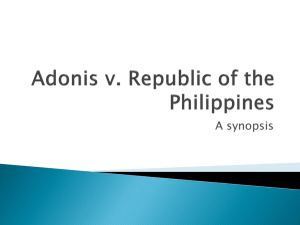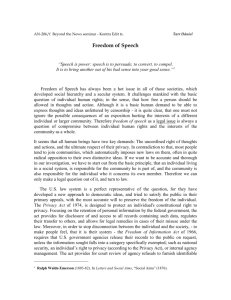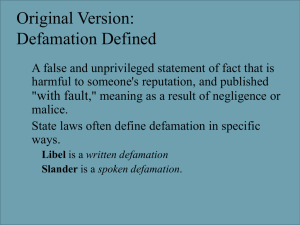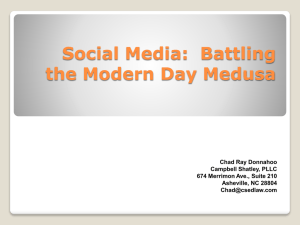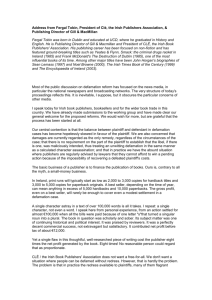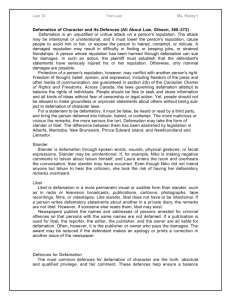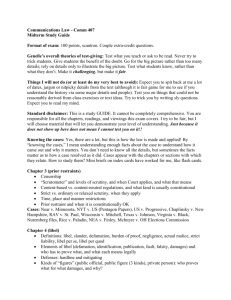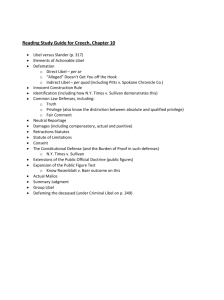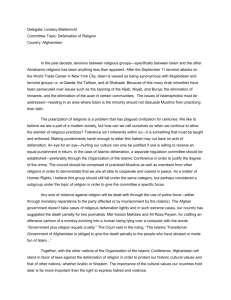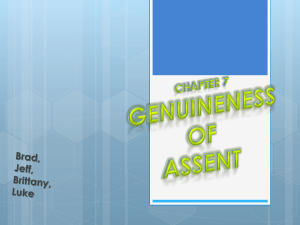Torts 2 Outline (2010) – Fischer
advertisement
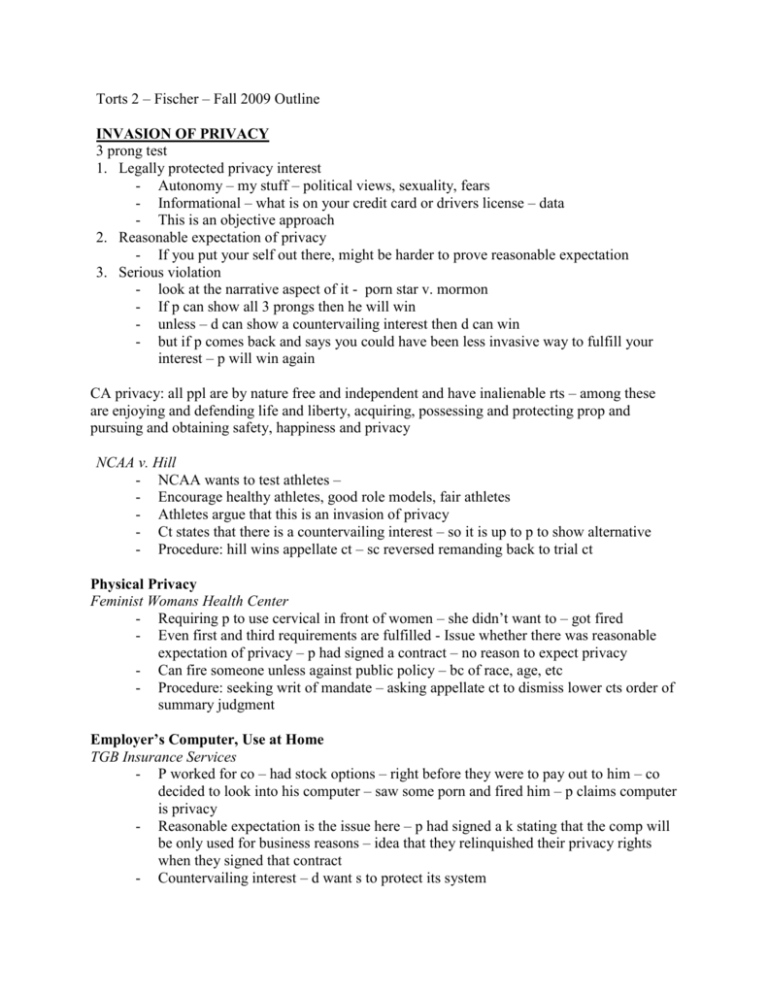
Torts 2 – Fischer – Fall 2009 Outline INVASION OF PRIVACY 3 prong test 1. Legally protected privacy interest - Autonomy – my stuff – political views, sexuality, fears - Informational – what is on your credit card or drivers license – data - This is an objective approach 2. Reasonable expectation of privacy - If you put your self out there, might be harder to prove reasonable expectation 3. Serious violation - look at the narrative aspect of it - porn star v. mormon - If p can show all 3 prongs then he will win - unless – d can show a countervailing interest then d can win - but if p comes back and says you could have been less invasive way to fulfill your interest – p will win again CA privacy: all ppl are by nature free and independent and have inalienable rts – among these are enjoying and defending life and liberty, acquiring, possessing and protecting prop and pursuing and obtaining safety, happiness and privacy NCAA v. Hill - NCAA wants to test athletes – - Encourage healthy athletes, good role models, fair athletes - Athletes argue that this is an invasion of privacy - Ct states that there is a countervailing interest – so it is up to p to show alternative - Procedure: hill wins appellate ct – sc reversed remanding back to trial ct Physical Privacy Feminist Womans Health Center - Requiring p to use cervical in front of women – she didn’t want to – got fired - Even first and third requirements are fulfilled - Issue whether there was reasonable expectation of privacy – p had signed a contract – no reason to expect privacy - Can fire someone unless against public policy – bc of race, age, etc - Procedure: seeking writ of mandate – asking appellate ct to dismiss lower cts order of summary judgment Employer’s Computer, Use at Home TGB Insurance Services - P worked for co – had stock options – right before they were to pay out to him – co decided to look into his computer – saw some porn and fired him – p claims computer is privacy - Reasonable expectation is the issue here – p had signed a k stating that the comp will be only used for business reasons – idea that they relinquished their privacy rights when they signed that contract - Countervailing interest – d want s to protect its system - Procedure: motion to compel – tgb wins the rt to discovery Personal Information, Medical Records Colleen M - Woman using x’s credit card – gets in vetro fertilization – when x called to see what charge was for – fertility store gave him the info – p sues claiming invasion of privacy - P loses bc despite privacy issue, a person paying for healthcare is permitted to deman info for what treat hes paying for - Statute here overrides the common law in ncaa - Procedure: Trial ct found summary judgment for clinic – p appeals Investigations Kelly v State Personnel Board - Criminal told cops of criminalist provided her w/ drugs – investigation begins – investigators ask p for 5 names – he refused claiming invasion of rt of privacy and freedom of association - Ct said that info requested was related to the investigation - This was an administrative matter – someone in govt can ask to have hearing to determine why fired – this is what p did – appealed all the way then went through the ct system - P argues there was an abuse of discretion – ct says there is a big public concern – cops can ask for this info - Didn’t got through ncaa steps bc this case was before ncaa - Procedure: superior ct denied petition for writ ordering reinstatement to criminalist position – p appeals Intrusion – Phone Call Monitoring Kearney v ssb - Calls from GA to CA – GA law only one party needed to consent to have calls recorded but CA both parties had to consent - Ct looks at CAs interested and what would be violated v GA - Balancing test – CA has an interest ot protect their laws – their citizens - Ct finds for CA – they have more to lose - But ct doesn’t subject GA to past damages of recordings – they just have to inform when all CA when recording from now on - Procedure: superior ct and appellate ct sustained demurrer – Kearney appealed to sc Home Addresses Planned Parenthood - Antiabortion activist – lawsuit arises – discovery includes giving names and contact info of abortion activities - It is important to give names and info for witnesses - But here, ct realized that there is risk to give these names – they have been cases where people have been killed who were pro-abortion – this was a compelling state purpose but ct reasons that using pseudonyms is a fine alternative - Procedure: lower ct granted the discovery order to disclose names – p appeals and higher ct issues writ of mandate to vacate the discovery order Rape Victim Identity Cox v Cohn - P sues news reporter for disclosing daughters name – she was a rape and murder victim who was 17 - Ct ruled news reporter got the name from the indictment – it was a public record – media has a rt to publish it - Ct saying our trials are public – we don’t wna self-censorship – if news reporters worried about what to publish – then they will be hesistant - Procedure: lower ct found for p – ct of appeals remanded and USSC reverse lower ct RIGHT OF PUBLICITY - celebrity’s rt to the exclusive use of his or her name and likeness - use one’s name for financial gain w/o his consent - rt of publicity survive after death Appropriation of Name or Likeness and Identity MLK v American Heritage Products - D selling bust of MLK and selling it – cente files suit to cease and desists - Ct finds that this violates rt of publicity – above - Even if mlk didn’t make money off his image while he was alive – it doesn’t matter – his image when to his heirs - Procedure: p files for an injunction – lower ct granted/denied in part – p appeals Appropriate of Commercial Identity Vana White - Samsung uses wheel of fortune type board and robot resembling vana w/o her consent - Focuses on appropriation of ps name or likeness - Case was thrown out but court here ruled that there can be a rt of publicity issue – have to leave this to the jury to decide - Procedure: District ct granted summary judgment for Samsung and vana appeals FALSE LIGHT 1. someone depicts you in a way that is so outrageous that causes humiliation – depiction is false 2. The person puts you in that image knows or should have known it is false (actual malice) For punitive damages, have to show actual malice People Bank v Globe - Mitchell ran a newsstand – globe ran a story about a grandma being pregnant and put ps picture on the story - P wins on false light – d trying to argue that story is not reasonably believable – main question whether there was actual malice - Ct finds for p – awards damages – there was false light Procedure: Mitchell sues globe – fury found for Mitchell re invasion of privacy and ieed – globe appeals Douglass v Hustler - Hustler published nude photos of p – p sues and wins - P claims those photos cast her in a false light – claims she will pose for playboy but not for hustler - Ct says she has a claim for false light – playboy difft than hustler - D argues that he already posed nude for playboy – no proof whether these photos in hustler shouldn’t have been published – no proof of actual malice - Procedure: p won – higher ct ruled that have to show actual malice- case remanded Cantrell v. Forest City Publishing Co - D does an article on p and her family – her husband died in the bridge collapse - P wasn’t even there when d did interviews – but article showed she was there - Ct rules this is false light bc it was false – but no punitive damages bc no actual malice - D appeals saying if there is no malice – the second prong of false light is not proven so p doenst have a case - Supreme ct says that all p has to prove is that d should have known the story was false – p proves this and d wins - Ct distinguishes this kind of malice from ny times malice – all she has to prove was reckless or wanton disregard for ps rts - Due to vicarious liability, newspaper held liable - Procedure: trial ct for p – d appeals and wins – p appeals to ussc and p wins DAMAGES - Actual damages = what the case cost – paying for the suffer, the cost of a contract, the actual damages o Consequential damages - Punitive Damages = teach d a lesson o Exemplary damages DEFAMATION Famous/public Actual damage Ny times malice Private person falsehood punitive Never available to a famous person Ny times malice (Gertz – matter of public concern) Private person falsehood Falsehood (Dun and bradstreet – private person and a private matter) - Make distinction of private v public figures – public figures put themselves out there – but private citizens don’t so they need more protection Slander – defamation when someone says something Libel – defamation when someone writes something about you Defamation – Public Figures NY Times v Sullivan - Civil rts organization put story in NY times – discussing racism and cops behavior – Sullivan sues NY Times - Ct comes up with actual malice = you published and knew or should have known it was false – reckless disregard for the truth - If public figure – have to prove actual malice to win for defamation - Private person has to prove falsehood - Ct says Sullivan a public figure – didn’t prove actual malice – NY times wins - Ct discusses importance of freedom of speech - Procedure: trial ct and appellate ct rule for p – sc reverses saying no actual malice Defamation – Actual Malice/ Parody Hustler v Falwell - Falwell a pastor – gives an interview to Hustler – Hustler makes that interview about the firs time Falwell had sex with his mom – p sues for defamation/libel - Ct finds this publication to be a parody - P won in trial ct for iied – hustler appealed saying have to use ny times actual malice standard for iied cases bc falwell is a public figure - Ussc agreed w/ hustler – parody didn’t make false statements claiming it to be true – it was exactly that a parody – if rule for falwell here then all political cartoonist would have major damages everytime they published - Rule in favor of hustler – protect you if you are doing something you know is false but doing out of humor – rt to parody Defamation – Job References Hassan v Mercy - P a doc applies to work at another hospital – current hospital he words for – d gave a bad referral and a convo which was bad for p - P sues for defamation and ct grants ds summary judgment bc said that information they shared w/ the other hospital was privileged - Hospital protected bc had a qualified privilege – can give bad referrals Safe Harbor - This is where you can slander, defame and libel and get away w/ it - Legislative Privilege – when you speak at legislative hearing, you can say anything you want – and no one can be sued - Litigation Immunity – wont be sued for what you say in a lawsuit, your testimony Privileges - Absolute privilege = excludes liability for a publication notwithstanding that it is made w/ actual malice - Qualified privilege = doesn’t protect d who acted maliciously o if you say something that is not true in recommendation – then you can be liable and sued - Associational Privilege o Also known as common interest privilege o If you don’t act w/ malice/hatred and if you are acting in good faith and you don’t spread it around to ppl – then you will probably win o But if you act in bad faith – then you are liable o Ex – someone gets fired and you have to testify – you say bad things about the person but don’t have bad faith and not in malice – you cant be held liable Private Person and Public Matter Gertz v Welch - Cop kills youth – family hires Gertz in a civil suit – American Opinion publishes article claiming Gertz to be a communist – Gertz sues for libel - D arguing that bc Gertz is a public figure – has to prove malice - Ct disagrees w/ d – saying p might be famous in the political field – if you defame him w/in that association – then p needs to prove malice - Bc in main realm he is a private person – all he needs to prove is that the article was false – p wins – but have to prove actual malice for punitive damages bc there is a public concern - Procedure: p won in trial and d appeals Private Person and Private Matter – Credit Information Dun and Bradstreet v Greenmoss Builders - Credit report includes false statements - Bc there is no public concern here – don’t have to prove ny times malice for punitive damages - Procedure: trial ct awards punitive damages, appellate ct moves for new judgment – sc reversed the grant of a new trial and ruled for p Westmoreland v CBS - P used to be a general in Vietnam – sues documentary portraying him to be part of a conspiracy to suppress intelligence - Cbs moves for summary judgment – saying they did research for their documentary - Ct rules that just bc they did research doesn’t mean they didn’t intent to defame - Even though media is highly protected – they don’t have a free pass to publish whatever they want - Ct rules that there is enough evidence to go to trial - Westmoreland a public figure – has to prove actual malice Libel Proof = your reputation is so terrible that you cant win a defamation claim – rep so badly tarnished that he cant further be injured by any statement Cerasani - Cerasani part of the mob – claims donni brasco film defamed him - Ct ruled that he cerasani has such a bad reputation that he is libel proof - D files motion to dismiss – ct grants it Entertained Serious Doubt St. Amant v Thompson - St amant running for office – gives a speech and discloses info re Thompson that he learned from albin – corruption w/ union – turns out info re Thompson is false - Thompson sues st amant - Ct rules that in order to determine whether someone acted w/ reckless disregard – have to ask whether he entertained serious doubt - Seems to be bonus to morons – can claim you never had serious doubt - Ussc says bc st amant never entertained any doubts – he isnot liable - Procedure: lowe grant granted for p – ct of appeals reversed saying no actual malice Newspaper Retarction Privilege – Slander/Libel Mercado v Hoefler - Real estate – Mercado working for hoefler selling homes - Mercado tries to sell home to Japanese man – hoefler sells Mercado bc doesn’t want to sell to minors – when public learns of the racism – heffler gives interview about how Mercado was a bad worker that’s why he got fired – Mercado sues for libel - Ct rules that bc he is a private person – have to prove only falsity - Law in CA – if want to get punitive damages for libel – you have to formally ask for a retraction and if they don’t retract then can win punitive damages – but if newspaper does retract then don’t get punitive damages - Bc Mercado never asked for a retraction – seems as though he wouldn’t win – but then his attorney says its slander – the interview is slander and then that interview was written - Mercado wins for slander and gets punitive damages Neutral reporter Privilege Khawar - Khawar stands next to kennedy’s podium the day of the assassination – take pics and globe runs article that it was khawar that killed kennedy - P sues a book that was previously published and the globe - Ct rejects glob’s neutral reporter privilege – all we said was that there was a book that reported this – we just reiterated the book - P here is an individual private person – everyone knows sirhan killed kennedy - Ct rejects neutral reporter privilege – says maybe we will consider it for a public figure but not for a private individual - P wins trial ct, appellate ct and supreme ct - P gets actual and punitive damages Resuscitating Old Facts Gates v Discovery Communications - P charged w/ accessory of murder 13 yrs ago – did his time and moved on w/ his life13 yrs later documentary on tv discussed the murder case - P files suit against tv station for invasion of privacy and defamation - Ct says that in Briscoe – used to be the case when something is so old and irrelevant to your life and someone publishes about it – it would be libel - Now ct overrules this – saying it is not libel - Truth is complete defense to an allegation of defamation - Also – info received here were from public records ANTI-SLAPP - Strategic lawsuits against public participation - Cts wants to deter ppl “slapping” others w/ lawsuits just so they can rid of their money – have no money left to defend themselvs - Don’t want to deter ppl to publicly participate – should not be intimdated w/ lawsuits Sipple - P known political activist – has strong stance against dv – but then article comes out about info that he was violent against his ex-wives – p sues for defamation Procedure: trial and appellate ct dismiss ps complaint Lower cts – info gotten from public records and p a public figure so has to prove actual malice D claiming that all p is doing is slapping us w/ a lawsuit Ct rules dv is a public concern – article discussing a public issue so this is part of antislapp – also that d is a public figure Internet Republication Privilege Barett - Broad immunity to protect those who use the internet to publish info that originated from another source - Distributors only liable if they knew the articles they posted had defamatory statements - P here a doc who files compliant against website saying bad things about doc – claiming libel - Ct rules that website didn’t write the article – they cant be liable for posting it - Trying to protect free internet speech and encourage self-regulation - Website not held liable - Procedure: lower ct dismissed case - appellate ct says can be liable for defamation – sc says no defamation for distributors Single Publication Rule – Discovery Rule Shivley - P testified at OJ case – then book written about her saying she is a felon probationer - P sues publisher for libel but sol has passed (for defamation sol 1 yr) - - Single publication rule – sol starts when book published – sol doesn’t restate unless new edition Discovery Rule – ppl you want to sue hid facts from you that are critical for you to know in order to sue – can argue discovery rule and sol will start from date you discovered the defamation – very rare Estoppel theory – don’t want to give p many opportunities to be able to sue yrs after the case – want d to be ready and no constant litigation ct rules p cant use discovery rule here – she cant bring the suit Procedure: p sues and ct grants demurrers saying sol passed – ct of appeals reverses lower ct and sc finds for d, agrees w/ trial court ASSOCIATION PRIVILEGE 1. Are your oral or written publication in good faith – no malice 2. Is there excessive distribution or excessive publication Common Interest Privilege Garziano v EI Du Pont - P sexually harasses matheny and co fires p - Plant issues bulletin about sexual harassment – doesn’t include ps name but apparent about p – p files suit for slander - D argues Associate Privilege - Qualified privilege – protecting communication btwn employers and employees o common interest privilege = Ppl in the same association – when ppl have a common interest in something, sometimes you are allowed to share info w/ them about someone - ct looks at the 2 prong test – their communication to employees were in good faith and weren’t excessive MISREPRESENTATION/ FRAUD - Concealment = passive fraud Nondisclosure = misleading me Fraud/deceive Mal practice = professionals who fail to meet a reasonable standard o Recklessness – know or should have known your actions would cause harm o Negligence – didn’t meet the standard that a reasonable professional would meet Opinions - did someone rely on them to the detriment - good faith opinions v bad faith opinions –lose on all bad faith opinions - person advances an opinion in which he does not honestly or cannot reasonbly believe, then an action for affirmative fraud Suing the Government - have to give claim notice – write letter w/in 100 days of incident telling them you are thinking of suing them if you don’t put them on notice, then you cant sue the govt Concealment/Non-Disclosure Cooper - case w/ bad condos - as realtor, have to disclose everything you know or should have known about the house - buyer also has to do some of his own hw - charges realtor, architect, inspectors Williams - p bought car thinking it had ac – claims he relied on the ad – but cant be true bc ad was published after he bought the car - ct said wasn’t fraud – basically he lied so he lost - but p could have had a case – how can you tell the difference btwn the ac and the vent – he thought it was ac so he bought the car - same rules here re fraud and disclosing all the info - p still has to have due diligence Federalizing State Fraud Claims Schmuck - p sells used cars – would take back the miles then sell the cars - this is a state crime but bc feds are trying to make it a fed crime – they say its mail fraud – the dmv apps he mailed were part of the scheme so its mail fraud - if feds can show that critical part of crime dealt w/ the mail fraud – then can federalize the case - pros proved that fraud isn’t complete until you sell the car and cant sell it until you mail that app to the dmv – pros won Falsifying Resumes - MIT admission director lied on her resume - Adoption clinic claiming they are nurses and a law clinic - Cook/food channel guy Endorsements Hansberry P buys shoes – wears some – falls bc slippery due to shoes – she sues She bought shoes off magazine that had seal of approval negligent misrepresentation – you endorse something that you don’t know you’re lying about but you are lying about it ct making up a new statute – neg misresp – you have to try the product if you are going to be endorsing it ct rules magazine liable – hey endorsed a prod –foreseeable ppl will be relying on the seal Procedure – judgment for dismissal – p appeals Deceptive Advertising Lavie Aleve case – gets ulcer when takes aleve – claims he was misled by advertising Least sophisticated consumer standard - have to see whether it fooled the least sophisticated consumer in ca o This is what the atty general wants to use Ct uses reasonable consumer standard – would reasonable consumer be fooled by the advertising o Exception to reasonable consumer standard Certain subgroups who are unusually susceptible Young children and elderly Procedure: trial ct for d and p appeals –appellate ct affirms – Aleve wins Funerals/Morticians Wilson v. Houston Subsection of tort law dealing w/ cemeteries and burials Drives to bank instead of funeral – wont take place unless he gets paid – crazy driver Particular area of law w/ emotions, certain rules, etc. o Torts here: false imprisonment, unprofessional conduct, breach of duty, implied covenant to provide appropriate/dignified burial service, breach of k Expressions of Fact v. Opinion Bose Article written about speakers that says it hovers about the room – bose sues Cooperation here is a person – corp can be defamed – usually public ppl Bose has to prove: article was false but writer knew it was false, acted w/ reckless disregard for the truth, entertained serious doubts Opinion – if you say an opinion that you yourself don’t believe – not protected Appellate cts cant revisit the facts – but exception on first am cases – o 1st am v. fed rule 52 a Ct looks at the facts and decides: o 1. bose is a public person o 2. has to prove ny times malice o 3. clear and convincing evidence of liability o 4. not convinced of the facts that p knew or should know his review was false or misleading Procedure – lowest ct for bose – appellate ct for d and ussc for d INTERFERENCE W/ BUSINESS Defaming Perishable Foods Texas Beef Oprah show w/ 3 experts on mad cow disease Perishable foods – something bad said about them – no one buys ex tomatoes for 2 mths – the whole industry can go out of business Can defame a whole industry here – industry of perishable foods Oprah’s defense – I had both sides – one saying meat was bad an other saying it wasn’t For defamation re perishable foods – need to prove: 1. person disseminates info relating to a perishable food product in public 2. person knows info is false 3. info states/implies that perishable food isn’t safe for consumption by the public need clear and convincing evidence re the elements above o Ct ruled don’t have clear and convincing evidence that Oprah aimed to destroy the industry Injunction re Defamation Balboa Bar case – p had hotel near bar – would harass customers and employees Cant stop someone from defamation – have to let them defame then bring lawsuit Here, woman found liable for defamation so judge issues a restraining order – not allowing her to say certain things D is challenging the injunction Ct rules that injunction in general after defamation cases is ok – but in this case – the injunction is too broad – have to be more specific Securities Fraud - PSLRA More cases coming about how ppl losing stocks and simply filing law suits Codes that protect cos from this Private Securities Litigation Reform Act – PSLRA If you want to claim fraud when you lose money from stocks – you have to prove: 1. you have to plead fraud w/ specificity o Who defrauded – what exactly was said – when and where was it said 2. whatever was said – that fraud was material to your loss o But for the fraud, I would have never bought the shares If you buy starbucks stock bc you like coffee – wont win on fraud – you were going to buy it anyway 3. reliance o Relied on what was said 4. fraud was done w/ scienter/knowledge o Person who defrauded knew they were fooling/defrauding you 5. fraud was proximate cause of your loss Blockbuster Case Moving from vhs to dvd – predicted it would transition fine But ended up losing lots of money Ppl start to sue – claiming Blockbuster misrepresented them - they raise PSLRA defense – Blockbuster wins Ct wanted specifics – wants p to prove what Blockbuster did defraded them Idea that cos should all use forward looking statements – caution o par at end of press release – cant know what is going to happen tomorrow - this is what we predict but not sure – covering your ass Blockbuster argued that they used forward looking statements – they win STOPPED AT WEEK 11 LECTURE STOPPED AT BILY CASE – WEEK 10 READING f - Trade Libel/ Injurious Falsehood - Defaming Perishable Foods? - Securities Fraud/ PSLRA - Accountants/ Auditors - Accountants/ Auditors
